Crypto World
Ethereum Price Faces 50% Breakdown Risk as DeFi TVL Slides
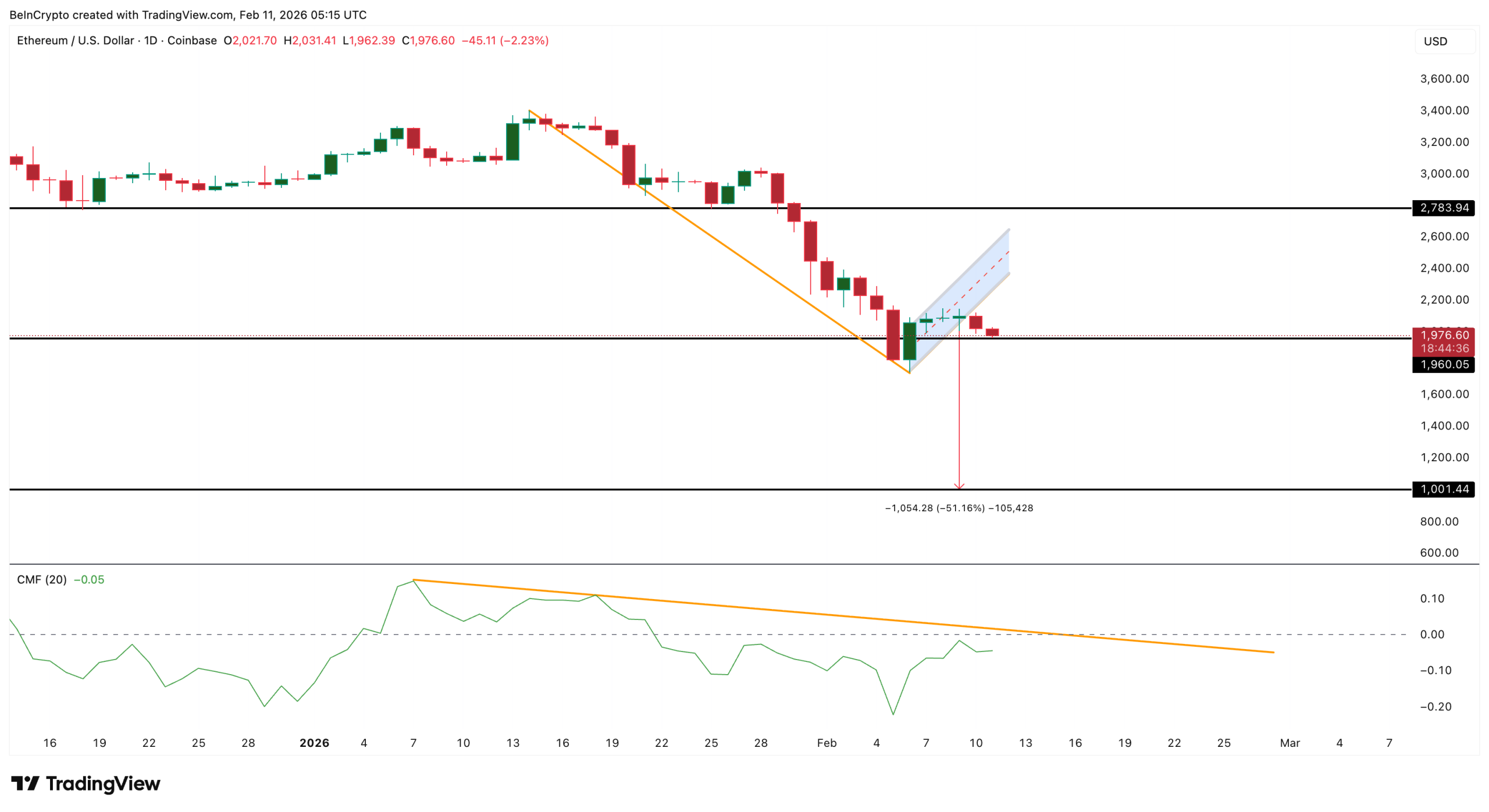
The Ethereum price is down more than 5% over the past few days and has now slipped below a key short-term structure. On February 10, ETH fell under $1,980 after failing to hold a narrow rebound channel. This move followed a sharp decline in DeFi activity and weakening institutional flows. Yet, despite the pressure, large holders have started adding again.
The question is simple: is this early accumulation, or just a temporary pause before another leg lower?
Pattern Break Confirms Weak ‘Big Money’ Support
Ethereum’s recent rebound from early February formed inside a bear flag. This structure acted like a short-term recovery attempt, not a trend reversal. On February 10, the price slipped below the lower boundary of the flag, triggering a pattern break with over 50% crash potential, as predicted in a previous Ethereum analysis.
Sponsored
Sponsored
This move mattered because it happened alongside weak money flow.
The Chaikin Money Flow, or CMF, measures whether capital is entering or leaving an asset using price and volume. When CMF moves above zero, it often shows large-scale institutional-style buying. When it stays below, it signals weak participation.
Between February 6 and February 9, ETH bounced, but CMF never crossed above zero. It also failed to break its descending trendline. This meant the rebound lacked strong backing from large investors.

Want more token insights like this? Sign up for Editor Harsh Notariya’s Daily Crypto Newsletter here.
In simple terms, the price moved up, but serious money did not follow strongly enough. When rebounds happen without strong CMF backing, they tend to fail. That is exactly what happened here. Once buying momentum stalled, sellers regained control and pushed ETH lower.
This confirms that the pattern break was not random. It was possibly supported by fading big money flows. But technical weakness alone does not explain the full picture.
DeFi TVL and Exchange Flows Reveal a Structural Problem
A deeper issue sits inside Ethereum’s DeFi activity.
Total Value Locked, or TVL, measures how much money is stored inside decentralized finance platforms. It reflects real usage, capital commitment, and long-term confidence. When TVL rises, users are locking funds. When it falls, capital is leaving.
Sponsored
Sponsored
BeInCrypto analysts combined the TVL and exchange flow dashboards to show a clear pattern.
On November 13, DeFi TVL stood at $75.6 billion. At the same time, ETH traded around $3,232. The exchange net position change was strongly negative, indicating more coins were leaving exchanges than entering. Investors were possibly moving ETH into self-custody.

That was a healthy setup.
By December 31, TVL had dropped to about $67.4 billion. ETH fell to $2,968. Exchange flows flipped positive. Around 1.5 million ETH moved onto exchanges. Selling pressure increased. Now look at February.
On February 6, DeFi TVL touched a three-month low of $51.7 billion. ETH was near $2,060. Exchange outflows weakened sharply (the Net Position line reached a local peak). Even though net flows stayed slightly negative, buying pressure collapsed, as explained by the February 6 peak. This shows a repeating relationship.
When TVL falls, exchange inflows rise or outflows weaken. That means capital is shifting from long-term use toward potential selling.
Sponsored
Sponsored
As of February 10, TVL has only recovered to around $55.5 billion, down almost $20 billion from the mid-November levels. That is still close to the three-month low. Without a stronger recovery, exchange-side pressure is likely to return. So the pattern break is happening while Ethereum’s core usage remains weak.
That is a structural problem, not just a chart issue.
Whale Accumulation and Cost Basis Explain the Ethereum Price Support
Despite weak technicals and falling TVL, whales have not fully exited.
Whale supply tracks how much ETH is held by large wallets, excluding exchanges. Since February 6, whale holdings fell from about 113.91 million ETH to nearly 113.56 million. That confirmed the distribution during the breakdown. But over the past 24 hours, this trend paused.

Holdings edged back up slightly, from 113.56 million ETH to 113.62 million, showing small-scale accumulation. This suggests that whales are testing support rather than committing fully.
The reason becomes clear when looking at cost basis data.
Sponsored
Sponsored
Cost basis heat maps show where large groups of investors bought their coins. These zones often act as support because holders defend their entry prices. For Ethereum, a major cluster sits between $1,879 and $1,898. Around 1.36 million ETH were accumulated in this range. That makes it a strong demand zone.

The current price is hovering just above this area.
As long as ETH stays above this band, whales have an incentive to defend it. Falling below would push many holders into losses and likely trigger heavier selling. This explains the cautious buying.
Whales are not betting on a rally. They are possibly protecting a critical cost zone.
From here, the Ethereum price structure becomes clear.
Support sits near $1,960 and then $1,845. A daily close below $1,845 would break the main cost cluster and confirm deeper downside risk. If that happens, the next major downside zones sit near $1,650 and $1,500.

On the upside, ETH must reclaim $2,150 to stabilize. Only above $2,780 would the broader bearish structure weaken. Until then, rebounds remain weak.
Crypto World
Over 9 million XRP transferred to KT DeFi, whale activity comes into focus

Disclosure: This article does not represent investment advice. The content and materials featured on this page are for educational purposes only.
The transfer of more than 9 million XRP to KT DeFi has sparked fresh discussion about whale activity and shifting capital flows within the crypto market.
Summary
- Blockchain data shows a whale moved over 9 million XRP to the KT DeFi platform, drawing attention to large-holder strategies and DeFi trends.
- Analysts suggest the transfer could be linked to liquidity management, yield optimization, or participation in cloud mining models.
- KT DeFi positions itself as a regulated UK-based digital asset mining platform with third-party audits, insurance coverage, and a multi-layered security framework.

Recent blockchain monitoring data shows that a whale address has transferred more than 9 million XRP to the KT DeFi platform. At current market prices, the transaction represents a substantial amount, quickly drawing market attention to large-holder capital movements and evolving trends within the DeFi ecosystem.
Industry analysts suggest the transfer may be related to liquidity allocation strategies, yield optimization adjustments, or participation in emerging models such as cloud mining.
KTDeFi: A regulated global digital asset mining service platform
KTDeFi is a UK-headquartered global digital asset mining service platform dedicated to providing compliant, transparent, and high-security digital asset participation solutions to users worldwide.
The company operates in accordance with applicable UK regulations and complies with relevant requirements under the European Union’s Markets in Financial Instruments Directive (MiFID II) framework. All operational processes, including platform management, asset custody, and profit distribution, are conducted within a clearly defined legal structure to ensure a secure and reliable investment environment.
Compliance and audit framework
To enhance operational transparency and system integrity, KT DeFi undergoes annual security and compliance audits conducted by the independent third-party firm PricewaterhouseCoopers (PwC).
In addition, client fund protection mechanisms are supported by insurance coverage through Lloyd’s of London, further strengthening risk mitigation and investor confidence.
Technology and security infrastructure
From a technical standpoint, KT DeFi employs a multi-layered security architecture to ensure stable platform operations and data protection:
- Cloudflare enterprise-grade protection, providing network acceleration and DDoS mitigation
- McAfee cloud security solutions, enabling real-time threat detection and data security
- High-performance ASIC and GPU hardware, optimizing computational efficiency and operational performance
The platform maintains 99.99% system uptime, supporting continuous and stable service delivery. To date, no major security incidents have been publicly disclosed.
User feedback from Europe
Amelie M. Kirk, IT Consultant from Munich, Germany, stated: “I have followed the digital asset market for years, but prefer stable and transparent yield models. KTDeFi’s cloud mining service offers clear information disclosure and fee structures that align with my long-term asset allocation strategy.”
Isabella, a business owner from Vienna, Austria, commented: “Compared to directly holding cryptocurrencies, this model feels less exposed to short-term price volatility. The platform’s emphasis on green energy is particularly important to me and enhances trust.”
Alexandra S. Wheeler, a finance professional from Zurich, Switzerland, added: “Compliance and risk management are essential to me. KTDeFi’s audit structure and European energy and operational infrastructure standards align closely with traditional financial frameworks.”
Management statement
Emma Louise Stevens, CEO of KT DeFi, stated: “KT DeFi is committed to helping global investors enhance the value of their digital assets within a lawful, transparent, and secure framework. We place particular emphasis on meeting European regulatory standards and continuously strengthening our risk management systems and sustainable development strategies.”
How to get started with KT DeFi
1. Register an account
Visit the official KT DeFi website and complete the registration process. New users may receive a $17 welcome bonus.
2. Deposit digital assets
Deposit XRP or other supported cryptocurrencies. Funds will be reflected in the users’ personal account dashboard.
3. Select a mining contract
Users can choose a cloud mining contract that suits their needs. Once activated, the system will automatically manage the mining or computational allocation process and distribute earnings according to the agreed terms.
For more information, please visit the official website.
Conclusion
As the digital asset market continues to evolve, whale capital movements and innovative yield models such as cloud mining are becoming key focal points for investors. The transfer of more than 9 million XRP to KT DeFi provides another significant data point for observing trends in the broader crypto ecosystem.
Disclosure: This content is provided by a third party. Neither crypto.news nor the author of this article endorses any product mentioned on this page. Users should conduct their own research before taking any action related to the company.
Crypto World
Hong Kong to issue stablecoin licences as Malaysia tests Ringgit digital assets


Major financial hubs in Asia are stepping up regulated digital asset efforts in 2026, with Hong Kong preparing to issue its first stablecoin licences as early as March, while Malaysia’s central bank begins testing ringgit-based stablecoins and tokenised deposits under its innovation hub.
Summary
- Hong Kong is preparing to issue its first stablecoin licences as early as March 2026, with regulators signaling a cautious rollout limited to a small number of fully compliant issuers.
- The framework emphasizes reserve backing, risk management, AML controls, and clear use cases, reinforcing Hong Kong’s push to position itself as a regulated digital finance hub.
- In parallel, Bank Negara Malaysia has launched pilots under its Digital Asset Innovation Hub to test ringgit-denominated stablecoins and tokenised deposits for wholesale and cross-border payments.
In Hong Kong, government officials confirmed that the territory is on track to grant its first batch of stablecoin issuer licences in March 2026 under a regulatory framework established by the Stablecoins Ordinance.
The ordinance requires prospective issuers to meet strict standards for use cases, risk controls, anti-money-laundering measures and reserve backing before they are authorized. Only a very limited number of licences is expected initially, as regulators focus on operational readiness and compliance.
Addressing the regulatory push, Hong Kong’s Financial Secretary and HKMA officials have reiterated their goal of fostering a safe and regulated stablecoin ecosystem, part of the city’s broader ambition to become a regional hub for digital finance, payments and tokenised assets.
Malaysia tests Ringgit stablecoins and tokenised deposits
In Kuala Lumpur, Bank Negara Malaysia’s Digital Asset Innovation Hub (DAIH) has onboarded three initiatives to test ringgit-denominated stablecoins and tokenised deposits for 2026.
These pilots, led by Standard Chartered Bank Malaysia, Capital A, Maybank and CIMB, will explore wholesale payment and settlement use cases, including domestic and cross-border flows. The tests are conducted in a controlled environment to assess implications for monetary and financial stability and to inform policy direction.
Under the DAIH, participants are evaluating how stablecoins and digital deposit tokens might streamline settlement, enhance liquidity and modernise institutional payment infrastructure while preserving regulatory safeguards.
Authorities in Malaysia plan to provide greater clarity on the use and policy framework for ringgit-linked digital assets by the end of 2026.
Together, these developments show a concerted regional trend toward formalising digital financial instruments.
Hong Kong’s move to grant licences for regulated stablecoin issuance dovetails with Malaysia’s ground-level experimentation with tokenised money, reflecting an increasing willingness among Asian regulators to integrate digital asset technologies into mainstream financial systems under strict oversight.
Crypto World
treasury firms face make-or-break test as $1.4b losses mount
Solana price prediction steep slide is hammering ETFs and corporate treasuries, with $1.4b in paper losses exposing how fragile institutional crypto risk-taking has become.
Summary
- Solana price prediction dropped about 38–40% in 30 days, from near $135 to the mid‑$80 range, even as January DEX volumes hit roughly $117b and daily activity neared 160m transactions.
- Spot Solana ETFs saw a $11.9m single‑day outflow and nearly $8.92m over the week, cutting AUM from above $1.1b to roughly $733m as professional money de‑risks.
- Corporate holders including Forward Industries, Sharps Technology, DeFi Development Corp, and Upexi now sit on an estimated $1.4b in unrealized SOL losses.
Solana (SOL) price prediction: latest selloff has turned into a stress test for both institutional vehicles and the handful of public companies that bet their treasuries on the network’s native token.
Solana price prediction seen as tailwinds for new hypothesis
Solana, the seventh‑largest cryptocurrency by market capitalization, plunged to a two‑year low near $67 early last week before clawing back to the $84–$87 band, leaving the asset down roughly 38% over the past 30 days and more than 70% below its January 2025 peak around $295. The move marks one of the steepest drawdowns among major layer‑1s in the current downturn, even as the network still processes around 160 million daily transactions and handled about $117 billion in DEX volume in January, briefly overtaking Ethereum on that metric.
Solana’s sharp reset has carved out the $84–$87 band as the first meaningful pivot zone, and if the network can sustain roughly 160 million daily transactions and DEX volumes anywhere near January’s $117 billion run‑rate, the current drawdown increasingly looks like late‑stage capitulation rather than the start of a structural collapse, opening room for a medium‑term recovery path back toward the $120–$150 area, while a clean break below $80 would invalidate this hypothesis and re‑open the door to a full retest of the two‑year low around $67 or even the $50–$60 range.
Institutional outflows and funds
Flows data underscore how quickly professional money is backing away. Solana‑focused exchange‑traded funds saw $11.9 million in net outflows on February 6, the second‑largest single‑day exit on record for the sector, cutting total assets under management from peaks above $1.1 billion to roughly $733 million. Grayscale’s SOL ETF shed $1.296 million on February 9, partly offset by $1.281 million of inflows into Bitwise’s BSOL product, leaving a marginal net outflow of $15,000 for the day but weekly redemptions still near $8.92 million.
These moves come against a wider backdrop of risk reduction across digital‑asset funds, with crypto investment products recently recording weekly outflows above $1.7 billion as macro uncertainty and tighter policy expectations weigh on sentiment.
Corporate treasuries in the red
The damage is most acute for listed firms that treated SOL as a balance‑sheet asset. The four largest disclosed corporate holders—Forward Industries, Sharps Technology, DeFi Development Corp, and Upexi—now sit on an estimated $1.4 billion in combined unrealized losses, according to recent treasury disclosures. Forward alone holds about 6.9 million SOL at an average entry near $232, leaving what amounts to “unrealized losses approaching $1 billion” with the token trading in the mid‑$80s, while its own equity has slid from almost $40 last year to roughly $5. Sharps Technology and DeFi Development Corp, holding roughly 1.9 million and 2.2 million SOL respectively, have watched their share prices fall between 59% and 80% over the past six months.
Technicals, self‑custody and broader market
Technicians warn that price structure is still fragile. Market analyst Alex Clay has flagged a completed head‑and‑shoulders breakdown targeting the $42 zone, with other chart watchers eyeing interim supports in the $50–$75 region and some calling for potential spikes down toward $30 if selling pressure accelerates. On‑chain, more than 1.07 million SOL have left centralized exchanges in just 72 hours, a shift analyst Ali Martinez interprets as fear‑driven self‑custody rather than aggressive dip‑buying, with the $100 mark now framed as the “critical psychological level” bulls must reclaim to repair sentiment.
Investors tracking the fallout across the Solana ecosystem and wider market can follow ongoing developments in institutional adoption, large‑cap balance‑sheet losses, and capitulation dynamics through recent coverage of Solana’s institutional deals, the mounting mark‑to‑market hit at major crypto‑exposed corporates, and the latest leg lower in altcoins.
Crypto World
Volatility ahead of US jobs report
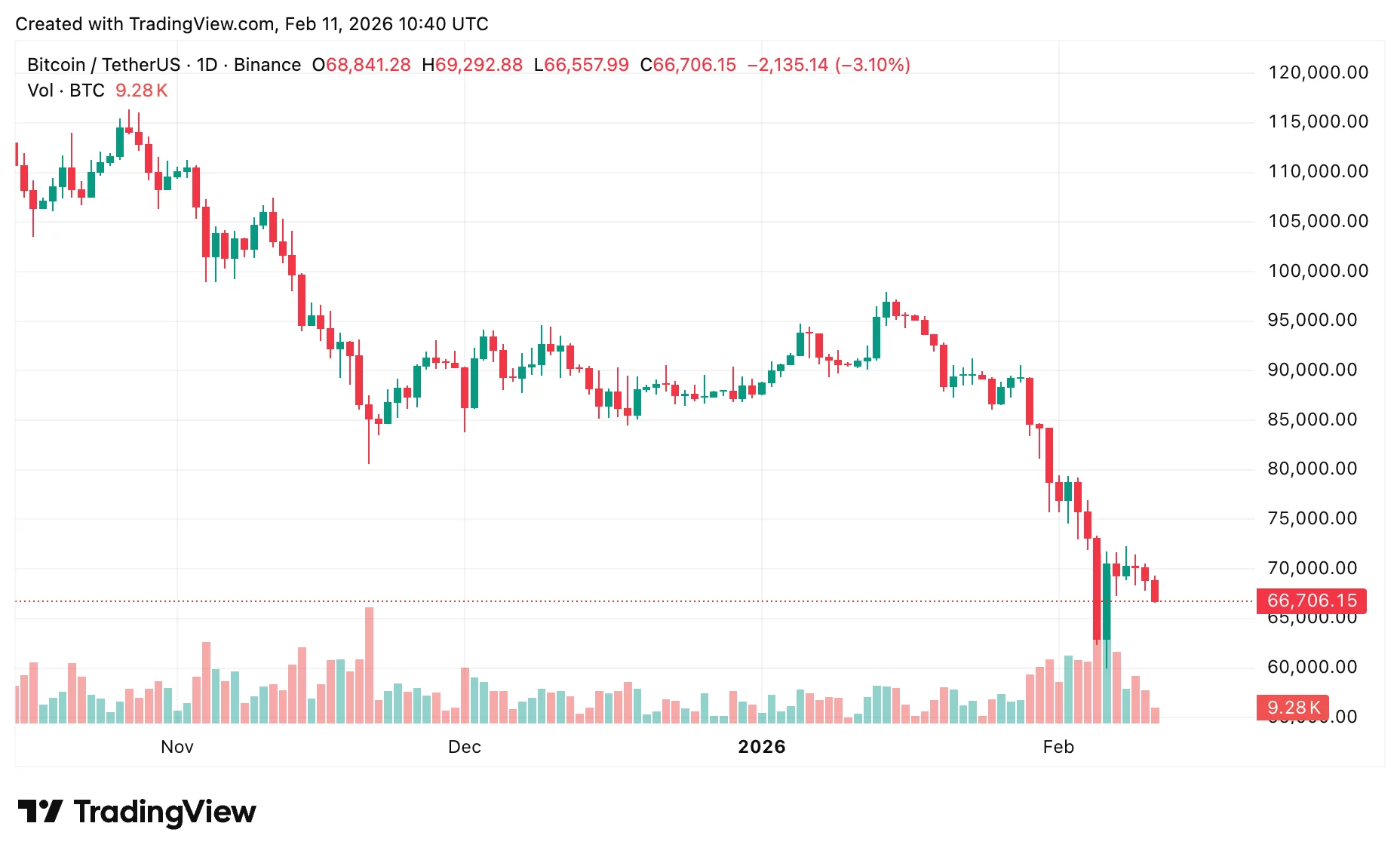
Bitcoin price is back on shaky ground ahead of Wednesday’s nonfarm payrolls release. The 8:30 a.m. ET data drop has traders on edge, as macro catalysts often trigger sudden volatility.
More than $250 million in leveraged trades were flushed out in just one day, hammering long positions the hardest. The move below short-term support blindsided bulls and reinforced how quickly this market can unravel.
Summary
- Bitcoin is trading near $66,700, slipping below $67,000, and triggering over $250 million in leveraged liquidations, mostly affecting long positions.
- Short-term momentum is bearish, with the $69,000–$71,000 range acting as key resistance and $72,000 needing a decisive breakout to shift momentum.
- Failure to reclaim $69,000–$71,000 could push Bitcoin toward $64,000, with $60,000 as a critical psychological support where panic selling may intensify.
Current market scenario: Technical weakness builds
As of February 11, Bitcoin (BTC) is trading near $66,700 after breaking below $67,000 and triggering another flush of liquidations.
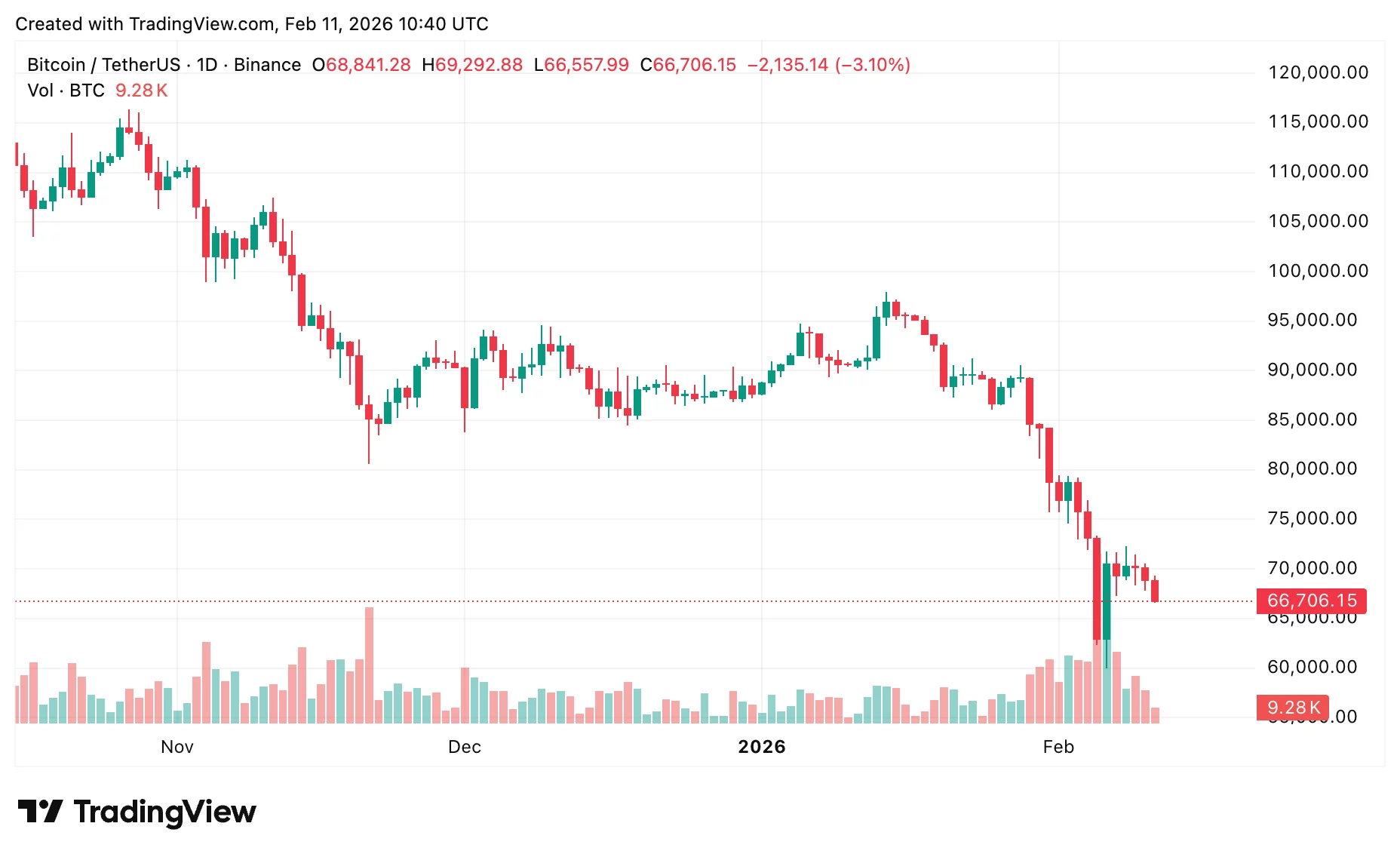
Traders see this as a break on the daily chart. The two-week support that had absorbed recent dips is gone, and momentum in the short term is clearly bearish.
Spikes in liquidations often reflect forced selling, not a steady trend. Still, the lack of a strong bounce is raising concerns about broader weakness.
All eyes are on Wednesday’s Nonfarm Payrolls report at 8:30 a.m. ET. Delayed by last month’s brief federal shutdown, the data is expected to move markets. Some Trump administration officials have suggested the numbers might come in weaker than expected, which could fuel rate-cut bets and support risk assets — though volatility is likely before any clear trend emerges.
Key levels to watch
From a technical view, the battle zone is clearly $69,000–$71,000. But even if Bitcoin rallies into that range, it’s resistance until proven otherwise.
A meaningful shift in momentum requires a decisive breakout above $72,000, confirmed by a strong daily close. Without it, any rally could quickly fizzle and remain part of the larger corrective move.
Failing to reclaim $69,000–$71,000 within 24 hours could open the door toward $64,000. Beneath that, the psychological $60,000 level comes into focus — an area where panic selling has historically intensified.
It’s a narrow window with high stakes. Bulls need to act fast. Bears are waiting patiently.
BTC price prediction: What comes next?
Macro catalysts are steering short-term moves. Should the jobs report fall short of expectations and risk appetite improve, Bitcoin price could climb toward resistance. But without decisively reclaiming $72,000, any rally risks fading quickly.
Should selling continue and a $64,000 break, the market could accelerate toward $60,000, where long-term buyers may step in. That zone may ultimately decide whether the broader uptrend holds.
The near-term Bitcoin price prediction leans toward continued volatility. The market is perched at a technical crossroads, and macro data may spark the next big move.
For now, the Bitcoin outlook is cautiously neutral-to-bearish, though a decisive breakout above $72,000 could swing sentiment sharply back toward the bulls.
Traders should prepare for rapid price action, as sharp moves could come in either direction.
Crypto World
Why Bitcoin Is Reacting More to Liquidity Than to Interest Rate Cuts
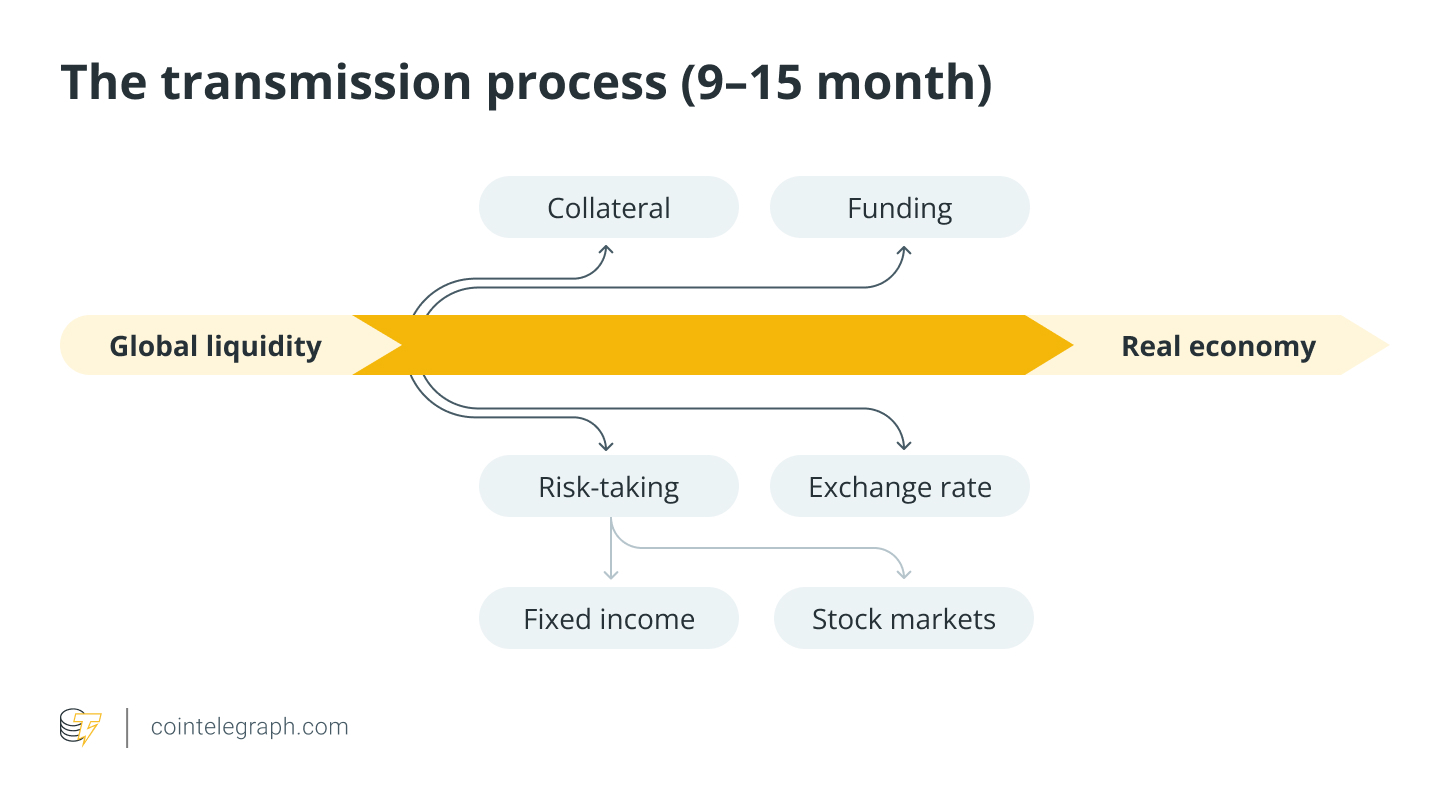
Key takeaways
-
Bitcoin now responds more to liquidity than to rate cuts. While rate cuts once drove crypto rallies, Bitcoin’s recent price action reflects actual cash availability and risk capital in the system, not just borrowing costs.
-
Interest rates and liquidity are not the same. Rates measure the price of money, while liquidity reflects the amount of money circulating. Bitcoin reacts more when liquidity tightens or loosens, even if rates move in the opposite direction.
-
When liquidity is abundant, leverage and risk-taking expand, pushing Bitcoin higher. When liquidity contracts, leverage can unwind quickly, which has often coincided with sharp sell-offs across stocks and commodities.
-
Balance sheets and cash flows matter more than policy headlines. The Fed’s balance sheet policy, Treasury cash management and money market tools directly shape liquidity and often influence Bitcoin more than small changes in policy rates.
For years, US Federal Reserve interest rate cuts have been a key macro signal for Bitcoin (BTC) traders. Lower rates typically meant cheaper borrowing, boosted risk appetite and sparked rallies in crypto. However, that classic link between Fed rate cuts and Bitcoin trading has weakened in recent months. Bitcoin now responds more to actual liquidity levels in the financial system than to expectations or incremental changes in borrowing costs.
This article clarifies why anticipated rate cuts have not pushed up Bitcoin recently. It explains why episodes of liquidity constraint have triggered synchronized sell-offs across crypto, stocks and even precious metals.
Rates vs. liquidity: The key difference
Interest rates represent the cost of money, while liquidity reflects the quantity and flow of money available in the system. Markets sometimes confuse the two, but they can diverge sharply.
The Fed might lower rates, yet liquidity could still contract if reserves are drained elsewhere. For instance, liquidity can tighten through quantitative tightening or the US Department of the Treasury’s actions. Liquidity can also rise without rate cuts through other inflows or policy shifts.
Bitcoin’s price action increasingly tracks this liquidity pulse more closely than incremental rate adjustments.
Did you know? Bitcoin often reacts to liquidity changes before traditional markets do, earning it a reputation among macro traders as a “canary asset” that signals tightening conditions ahead of broader equity sell-offs.
Why rate cuts no longer drive Bitcoin as strongly
Several factors have diminished the impact of rate cuts:
-
Heavy pre-pricing: Markets and futures often anticipate cuts well in advance, pricing them in long before they happen. By the time a cut occurs, asset prices may already reflect it.
-
Context matters: Cuts driven by economic stress or financial instability can coincide with de-risking. In such environments, investors tend to reduce exposure to volatile assets even if rates are falling.
-
Cuts do not guarantee liquidity: Ongoing balance sheet runoff, large Treasury issuance or reserve drains can keep the system constrained. Bitcoin, as a volatile asset, tends to react quickly to these pressures.
Bitcoin as a liquidity-sensitive, high-beta asset
Bitcoin’s buyers rely on leverage, available risk capital and overall market conditions. Liquidity influences these factors:
-
In environments with abundant liquidity, leverage flows freely, volatility is more tolerated, and capital shifts toward riskier assets.
-
When liquidity is constrained, leverage unwinds, liquidations cascade, and risk appetite vanishes across markets.
This dynamic suggests Bitcoin behaves less like a policy rate trade and more like a real-time gauge of liquidity conditions. When cash becomes scarce, Bitcoin tends to fall in tandem with equities and commodities, regardless of the Fed funds rate.

What lies behind liquidity
To understand how Bitcoin reacts in various situations, it helps to look beyond rate decisions and into the financial plumbing:
-
Fed balance sheet: Quantitative tightening (QT) shrinks the Fed’s holdings and pulls reserves from banks. While markets can handle early QT, it eventually constrains risk-taking. Signals about potential balance sheet expansion can at times influence markets more than small changes in policy rates.
-
Treasury cash management: The US Treasury’s cash balance acts as a liquidity valve. When the Treasury rebuilds its cash balance, money moves out of the banking system. When it draws the balance down, liquidity is released.
-
Money market tools: Facilities like the overnight reverse repo (ON RRP) absorb or release cash. Shrinking buffers make markets more reactive to small liquidity shifts, and Bitcoin registers those changes rapidly.
Did you know? Some of Bitcoin’s sharpest intraday moves have occurred on days with no Fed announcements at all but coincided with large Treasury settlements that quietly drained cash from the banking system.
Why recent sell-offs felt macro, not crypto-specific
Lately, Bitcoin drawdowns have aligned with declines in equities and metals, pointing to broad liquidity stress rather than isolated crypto issues. This cross-asset synchronization underscores Bitcoin’s integration into the global liquidity framework.
-
Fed leadership and policy nuances: Shifts in expected Fed leadership, particularly views on balance sheet policy, add complexity. Skepticism toward aggressive expansion signals tighter liquidity ahead, which affects Bitcoin prices more intensely than small rate tweaks.
-
Liquidity surprises pack a bigger punch: Liquidity shifts are less predictable and transparent, and markets are not as adept at anticipating them. They quickly affect leverage and positioning. Rate changes, however, are widely debated and modeled. Unexpected liquidity drains can catch traders off guard, with Bitcoin’s volatility magnifying the effect.

How to think about Bitcoin’s macro sensitivity
Over long periods, interest rates shape valuations, discount rates and opportunity costs. In the current regime, however, liquidity sets the near-term boundaries for risk appetite. Bitcoin’s reaction becomes more volatile when liquidity shifts.
Key things to monitor include:
-
Central bank balance sheet signals
-
Treasury cash flows and Treasury General Account (TGA) levels
-
Stress or easing signals in money markets.
Rate cut narratives can shape sentiment, but sustained buying depends on whether liquidity supports risk-taking.
The broader shift
Bitcoin was long seen as a hedge against currency debasement. Today, it is increasingly viewed as a real-time indicator of financial conditions. When liquidity expands, Bitcoin benefits; when liquidity tightens, Bitcoin tends to feel the pain early.
In recent periods, Bitcoin has responded more to liquidity conditions than to rate cut headlines. In the current phase of the Bitcoin cycle, many analysts are focusing less on rate direction and more on whether system liquidity is sufficient to support risk-taking.
Cointelegraph maintains full editorial independence. The selection, commissioning and publication of Features and Magazine content are not influenced by advertisers, partners or commercial relationships.
Crypto World
Arkham Exchange Denies Shutdown Reports, CEO Says Shifting to DEX
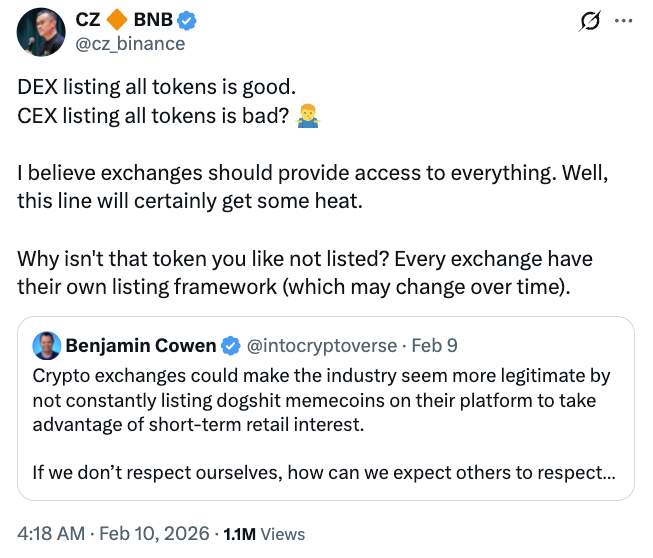
Arkham Exchange is not shutting down, despite reports to the contrary, and is instead redesigning itself as a decentralized trading platform, the company confirmed to Cointelegraph.
The crypto trading platform launched by data analytics firm Arkham Intelligence is shifting from a centralized model to a fully decentralized exchange (DEX), Arkham CEO Miguel Morel told Cointelegraph on Wednesday.
“The future of crypto trading is decentralized, and that’s what we’re building towards,” Morel said.
Launched in 2024, Arkham Exchange allows users to trade both spot crypto and perpetual contracts. The platform launched a mobile app in late 2025. At the time of writing, Arkham reports average daily trading of around $640,000, according to CoinGecko data.
Centralized platforms have become “unresponsive” to user needs
Arkham’s shift to a DEX comes as debate intensifies over how centralized exchanges (CEXs) manage token listings, with decentralized rivals increasingly viewed as offering greater flexibility and openness.
“Centralized incumbents have become bloated and unresponsive to user needs, becoming worse than the traditional financial systems they pretend to improve on,” Morel noted, adding: “We don’t want to invest in that.”

The move also aligns with a broader industry trend, as DEX-to-CEX trading volume ratios reached new highs in 2025 after more than tripling since 2020, according to CoinGecko.
Perpetual DEXs in particular saw explosive growth. In 2025, perp DEX volumes almost tripled their volumes, from $4.1 trillion at the start of the year to as much as $12 trillion. The surge reflected a sharp spike in onchain derivatives usage, as perp DEXs absorbed a growing share of leveraged crypto trading activity.
Related: Ledger adds OKX DEX integration for on-device token swaps
“Decentralized trading, especially for perpetuals, has exploded because it is a return to what made crypto so exciting in the first place,” Morel said, adding:
“It is cheaper, faster, and gives users custody of their own assets. We are excited about returning to the financial frontier and delivering the best trading experience for our users.”
Arkham did not immediately respond to Cointelegraph’s request for additional details on the timeline for its transition to a DEX. This article will be updated if and when further information becomes available.
Magazine: Bitcoin difficulty plunges, Buterin sells off Ethereum: Hodler’s Digest, Feb. 1 – 7
Crypto World
EU Parliament Backs Digital Euro, Signaling a New Era for Money

The European Parliament backed the European Central Bank’s (ECB) digital euro initiative, casting it as a strategic tool in an era of rising geopolitical and financial tensions. In a plenary vote, MEPs approved the annual ECB report by 443 votes in favor, 71 against and 117 abstentions, endorsing amendments that frame the digital euro as essential to strengthening EU monetary sovereignty, reducing fragmentation in retail payments, and bolstering the integrity of the single market. The resolution underscores a policy stance that public money in digital form can curb Europe’s reliance on non-EU payment providers and private instruments, a concern voiced by policymakers amid broader global pressures.
Lawmakers also pressed for central bank autonomy, arguing that ECB independence must be safeguarded from political interference to preserve price stability and market confidence. In the debate, Johan Van Overtveldt, a former Belgian finance minister and MEP, warned that independence is not merely a technical characteristic; history shows that political meddling with central banks can trigger inflation, financial instability, and domestic strain. The emphasis on autonomy reflects a long-standing belief among European lawmakers that monetary policy should be shielded from short-term political cycles, a sentiment echoed as Europe maps out a retail payments framework that could influence the region’s financial architecture for years to come.
The discussion also touched on the broader narrative of digital finance as a public good and a geopolitical hedge. The European Parliament’s stance aligns with a growing consensus among central bankers and economists that a digitally native euro could serve as a sovereign tool—built on European infrastructure and standards—that reduces exposure to external payment rails and foreign governance. In remarks that circulated last month, ECB executive board member Piero Cipollone described the digital euro as “public money in digital form” and tied it to concerns about the “weaponisation of every conceivable tool,” a reflection of the risk environment surrounding global finance. Cipollone argued for a payments system that Europeans fully control, emphasizing resilience and strategic autonomy as key design principles.
The resolution also reiterates that cash remains a cornerstone of the euro area’s monetary system. Even as the ECB advances a digital complement, both physical and digital euros are designated as legal tender, ensuring that the public retains access to a universally accepted form of money. This stance is consistent with a broader push to position the digital euro not as a replacement for cash but as a parallel instrument designed to streamline cross-border transactions, improve settlement efficiency, and reduce reliance on external providers in times of stress. The emphasis on maintaining cash aligns with concerns about inclusivity and financial access, particularly for segments of the population that rely on traditional cash channels or may be unevenly served by new digital rails.
Digital euro as public good and geopolitical hedge
Beyond its domestic implications, the vote signals how Europe contends with a shifting global payments landscape. The digital euro is framed as a public good meant to strengthen policy sovereignty, reassuring citizens that EU institutions will steward a secure, interoperable, and accessible payments infrastructure. The debate also reflects unease about the potential dominance of non-EU payment schemes and the geopolitical leverage that private digital-payment networks could wield in a crisis. By advancing a centralized, EU-controlled alternative, policymakers aim to preserve policy levers and maintain financial stability even when external networks face disruptions or strategic realignments.
The debate has continued to unfold in parallel with calls from economists and policy experts who argue for a robust public option. In January, a coalition of economists urged MEPs to prioritize the public interest in the digital euro project, warning that neglecting a strong EU option could leave the bloc more exposed to the influence of private and foreign players in its financial system. The push reflects a nuanced balance: leveraging digital innovation to improve efficiency and security while safeguarding public accountability and democratic oversight. The outcome of these discussions will shape not only how the euro area processes payments but also how Europe positions itself in global debates over digital sovereignty and financial regulation.
The broader policy environment around the digital euro is evolving as institutions contemplate both technical and governance dimensions. While the central bank’s autonomy remains a central pillar, the political process will continue to shape the instrument’s scope, privacy protections, and interoperability with existing payment rails. As Europe progresses, observers will watch for concrete milestones such as governance models, technical standards, and timelines for testing and deployment. The interplay between public and private sector interests, along with the union’s approach to data privacy and consumer protection, will be critical in determining the digital euro’s adoption trajectory and its reception among citizens and businesses alike.
Why it matters
The European Parliament’s endorsement of the digital euro underscores a shift in how Europe conceptualizes money in a digital era. For consumers, the availability of a euro-denominated digital instrument promises faster and cheaper retail payments across member states, with the added security of a centralized, Europe-wide framework. For businesses, a unified, EU-controlled platform could simplify cross-border settlements and reduce exposure to the fragility of foreign payment rails, particularly in times of geopolitical stress. For policymakers, the project represents an opportunity to align monetary policy with digital infrastructure, ensuring that policy tools remain effective in a rapidly evolving payments landscape.
For fintechs and developers, the digital euro offers a defined public utility that could serve as a foundation for innovative payment experiences while adhering to European standards for privacy, security, and market integrity. The emphasis on independence and robust governance signals a carefully calibrated path to deployment—one that seeks to incentivize responsible innovation while maintaining a strict line against political meddling that could destabilize markets. In this sense, the digital euro is less about a single currency-proof-of-concept and more about how a highly developed regional economy can harmonize monetary integrity with digital modernization in a way that strengthens resilience and confidence across the bloc.
For the broader crypto and digital assets discourse, the EP’s position reinforces a divide between public, centrally issued digital money and the private, often cross-border nature of crypto and stablecoins. While not a cryptocurrency itself, the digital euro’s design and governance could influence how lawmakers approach non-sovereign digital assets, including questions about payments settlement, privacy standards, and cross-border interoperability. The outcome will likely feed into ongoing debates about regulatory clarity, consumer protection, and the degree to which public and private digital money can coexist without compromising financial stability.
What to watch next
- Progress updates from the ECB on digital euro development, including governance and technical architecture.
- Further parliamentary discussions and amendments clarifying the balance between independence, oversight, and integration with existing payment systems.
- Policy guidance on the role of cash in a digital euro era and how legal tender considerations will be maintained.
- Potential pilots or phased rollouts that test interoperability with national infrastructures and private payment providers.
Sources & verification
- European Parliament press release: MEPs stress the importance of independent central banks in times of tension (https://www.europarl.europa.eu/news/da/press-room/20260205IPR33621/meps-stress-importance-of-independent-central-banks-in-times-of-tension)
- Transcript and remarks from Johan Van Overtveldt on ECB independence (https://www.europarl.europa.eu/plenary/en/vod.html?mode=chapter&vodLanguage=EN&internalEPId=2017060832131&providerMeetingId=20260209-0900-PLENARY#)
- ECB executive board member Piero Cipollone’s comments on digital euro as public money (https://cointelegraph.com/news/ecb-s-cipollone-says-digital-euro-key-to-payments-sovereignty-in-weaponised-world)
- Analysis and commentary from economists urging a strong public option for the digital euro (https://cointelegraph.com/news/70-economists-eu-lawmakers-digital-euro)
Monetary sovereignty in the digital age: Europe’s digital euro push
In summary, the European Parliament’s latest vote signals a consensus that the digital euro should be developed with an eye toward sovereignty, resilience, and public value. It recognizes the need to preserve monetary policy autonomy in the face of evolving digital finance dynamics while acknowledging the practical benefits of faster, more inclusive payments across the union. By insisting that cash remains legal tender and by prioritizing independence, lawmakers aim to construct a framework that can withstand geopolitical disruptions and shifting power dynamics in the payments landscape. The path forward will require careful calibration of governance, technology, and regulatory oversight—an undertaking that will shape Europe’s financial infrastructure for the foreseeable future.
Crypto World
North Korea Linked Hackers Deploy New Crypto Malware
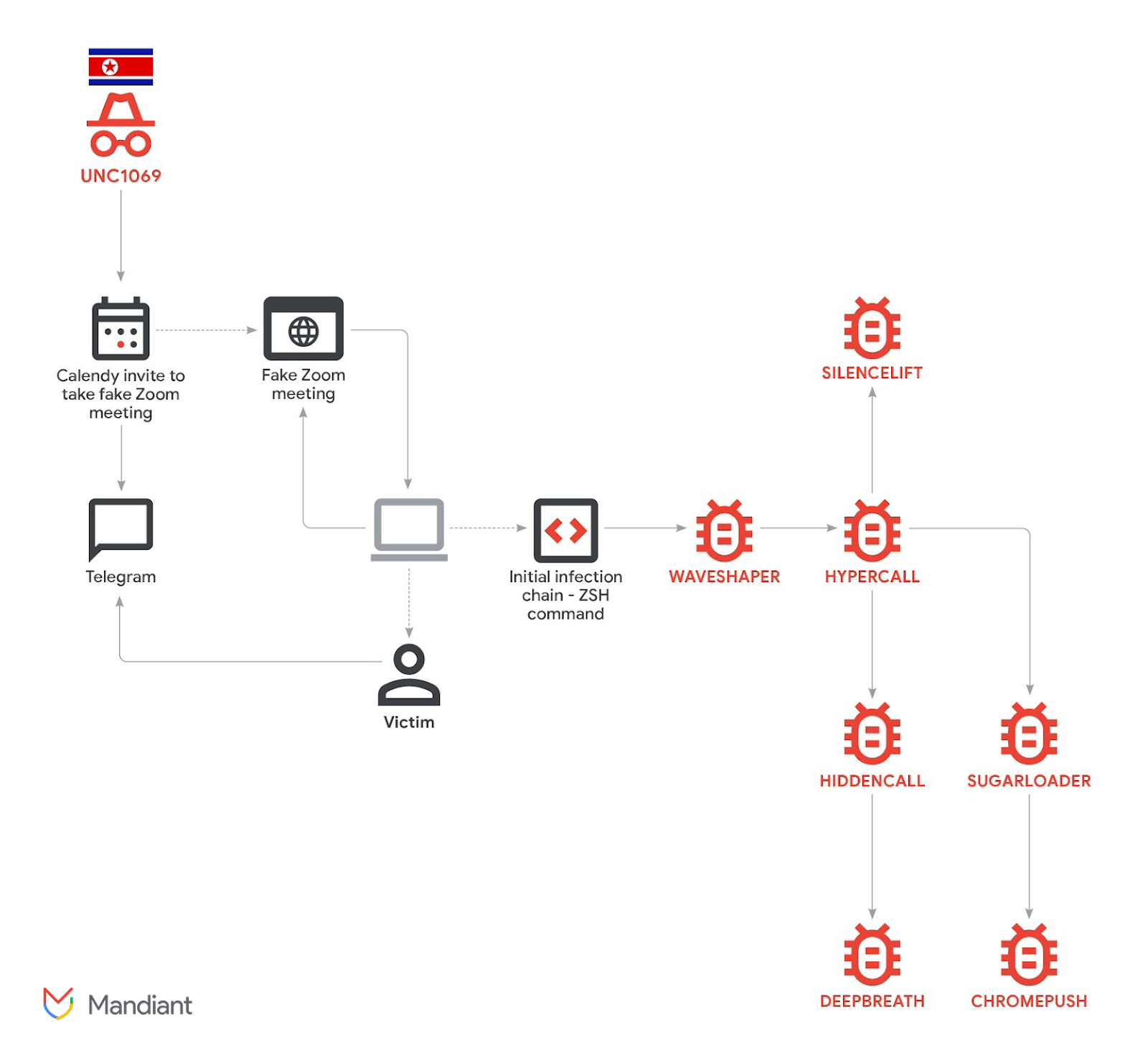
North Korea-linked threat actors are escalating social engineering campaigns targeting cryptocurrency and fintech companies, deploying new malware designed to harvest sensitive data and steal digital assets.
In a recent campaign, a threat cluster tracked as UNC1069 deployed seven malware families aimed at capturing and exfiltrating victim data, according to a Tuesday report from Mandiant, a US cybersecurity firm that operates under Google Cloud.
The campaign relied on social engineering schemes involving compromised Telegram accounts and fake Zoom meetings with deepfake videos generated through artificial intelligence tools.
“This investigation revealed a tailored intrusion resulting in the deployment of seven unique malware families, including a new set of tooling designed to capture host and victim data: SILENCELIFT, DEEPBREATH and CHROMEPUSH,” the report states.

Related: CZ sounds alarm as ‘SEAL’ team uncovers 60 fake IT workers linked to North Korea
Mandiant said the activity represents an expansion of the group’s operations, primarily targeting crypto firms, software developers and venture capital companies.
The malware included two newly discovered, sophisticated data-mining viruses, named CHROMEPUSH and DEEPBREATH, which are designed to bypass key operating system components and gain access to personal data.
The threat actor with “suspected” North Korean ties has been tracked by Mandiant since 2018, but AI advancements helped the malicious actor scale up its operations and include “AI-enabled lures in active operations” for the first time in November 2025, according to a report at the time from the Google Threat Intelligence Group.
Cointelegraph contacted Mandiant for additional details regarding the attribution, but had not received a response by publication.
Related: Balancer hack shows signs of months-long planning by skilled attacker
Attackers are stealing crypto founder accounts to launch ClickFix attacks
In one intrusion outlined by Mandiant, attackers used a compromised Telegram account belonging to a crypto founder to initiate contact. The victim was invited to a Zoom meeting featuring a fabricated video feed in which the attacker claimed to be experiencing audio problems.
The attacker then directed the user to run troubleshooting commands in their system to fix the purported audio issue in a scam known as a ClickFix attack.
The provided troubleshooting commands had embedded a hidden single command that initiated the infection chain, according to Mandiant.

North Korea-linked illicit actors have been a persistent threat to both crypto investors and Web3-native companies.
In June 2025, four North Korean operatives infiltrated multiple crypto firms as freelance developers, stealing a cumulative $900,000 from these startups, Cointelegraph reported.
Earlier that year, the Lazarus Group was linked to the $1.4 billion hack of Bybit, one of the largest crypto thefts on record.
Magazine: Coinbase hack shows the law probably won’t protect you — Here’s why
Crypto World
As bitcoin (BTC) price extends declines, industry figures say it’s time to buy: Crypto Daybook Americas

By Francisco Rodrigues (All times ET unless indicated otherwise)
Bitcoin dropped for a third straight day after failing to remain above the $70,000 hit during the weekend recovery as spot trading volumes thinned and theCrypto Fear and Greed Index held in “extreme fear” territory.
The broader crypto market capitalization has slipped to about $2.28 trillion, with the CoinDesk 20 (CD20) index losing 3.4% over the past 24 hours. Even so, onchain data aggregator Glassnode described the pullback as modest by past standards, with no signs of panic selling seen in prior cycle peaks.
Despite the lower volumes and poor sentiment, inflows to spot bitcoin ETFs have been steady over the past three days, helping absorb some selling pressure. The market is now in a price discovery phase, according to Wintermute.
“With spot volumes still relatively light, leverage is driving short term moves as was illustrated by BTC squeezing back up from the lows last friday on the back of heavily crowded perp shorts,” Wintermute desk strategist Jasper De Maere wrote in an emailed note. “It’s likely the market will continue to whip across this range as its still in price discovery.“
Major figures appear to remain bullish. Speaking at Consensus Hong Kong, Tom Lee, chief investment officer of Fundstrat and chairman of ether treasury firm BitMine Immersion (BMNR), told investors they should look for entry points rather than try to time a bottom.
On CNBC, Michael Saylor, executive chairman of bitcoin treasury firm Strategy (MSTR), reiterated his long-term bet on the cryptocurrency, saying he expects it to outperform traditional equities despite the drawdown.
Weak U.S. retail sales have moderately lifted U.S. interest rate-cut expectations and weighed on the dollar. Now, attention will switch to today’s nonfarm payrolls figures and inflation data, which could further influence risk appetite. Stay alert.
Read more: For analysis of today’s activity in altcoins and derivatives, see Crypto Markets Today
What to Watch
For a more comprehensive list of events this week, see CoinDesk’s “Crypto Week Ahead“.
- Crypto
- Feb. 11: Immutable to complete the merge of Immutable X and Immutable zkEVM.
- Macro
- Feb. 11, 8:30 a.m.: U.S. nonfarm payrolls for January Est. 70K (Prev. 50K)
- Feb. 11, 8:30 a.m.: U.S. unemployment rate for January Est. 4.4%(Prev. 4.4%)
- Feb. 11, 8:30 a.m.: U.S. average hourly earnings for January YoY Est. 3.8% (Prev. 3.6%)
- Earnings (Estimates based on FactSet data)
Token Events
For a more comprehensive list of events this week, see CoinDesk’s “Crypto Week Ahead“.
- Governance votes & calls
- Feb. 11: Ripple to host XRP Community Day on X Spaces discussing XRP adoption, regulated finance and innovation.
- Unlocks
- Token Launches
- Feb. 11: Coinbase to list RaveDAO (RAVE), DeepBook (DEEP), and Walrus (WAL).
Conferences
For a more comprehensive list of events this week, see CoinDesk’s “Crypto Week Ahead“.
Market Movements
- BTC is up 0.25% from 4 p.m. ET Tuesday at $66,868.63 (24hrs: -3.14%)
- ETH is down 2.96% at $1,947.84 (24hrs: -3.25%)
- CoinDesk 20 is down 2.75% at 1,900.89 (24hrs: -3.53%)
- Ether CESR Composite Staking Rate is up 1 bp at 2.83%
- BTC funding rate is at -0.0023% (-2.536% annualized) on Binance

- DXY is down 0.3% at 96.50
- Gold futures are up 1.73% at $5,117.80
- Silver futures are up 6.22% at $85.39
- Nikkei 225 closed up 2.28% at 57,650.54
- Hang Seng closed up 0.31% at 27,266.38
- FTSE is up 0.50% at 10,405.94
- Euro Stoxx 50 is down 0.41% at 6,022.26
- DJIA closed on Tuesday up 0.1% at 50,188.14
- S&P 500 closed down 0.33% at 6,941.81
- Nasdaq Composite closed down 0.59% at 23,102.47
- S&P/TSX Composite closed up 0.71% at 33,256.83
- S&P 40 Latin America closed down 0.57% at 3,746.47
- U.S. 10-Year Treasury rate is down 1 bps at 4.135%
- E-mini S&P 500 futures are unchanged at 6,966.50
- E-mini Nasdaq-100 futures are unchanged at 25,218.00
- E-mini Dow Jones Industrial Average Index futures are up 0.13% at 50,338.00
Bitcoin Stats
- BTC Dominance: 59.12% (-0.29%)
- Ether-bitcoin ratio: 0.02914 (-0.81%)
- Hashrate (seven-day moving average): 1,002 EH/s
- Hashprice (spot): $33.56
- Total fees: 2.6 BTC / $179,640
- CME Futures Open Interest: 120,785 BTC
- BTC priced in gold: 13.1 oz.
- BTC vs gold market cap: 4.46%
Technical Analysis

- BTC/USD is currently hovering below the 200-week exponential moving average, a critical support level that must be reclaimed to prevent further downside.
- The market now awaits the weekly close to confirm whether this breach marks a definitive breakdown or a temporary deviation.
Crypto Equities
- Coinbase Global (COIN): closed on Tuesday at $162.51 (-2.83%), -3.39% at $157.00 in pre-market
- Circle Internet (CRCL): closed at $59.75 (-0.58%), -1.84% at $58.65
- Galaxy Digital (GLXY): closed at $21.19 (+0.19%), -1.75% at $20.82
- Bullish (BLSH): closed at $32.05 (+0.00%), -1.68% at $31.51
- MARA Holdings (MARA): closed at $7.66 (-4.96%), -3.13% at $7.42
- Riot Platforms (RIOT): closed at $14.83 (-0.94%), -2.29% at $14.49
- Core Scientific (CORZ): closed at $18.13 (-2.26%), -2.48% at $17.68
- CleanSpark (CLSK): closed at $10.03 (-1.57%), -2.49% at $9.78
- CoinShares Valkyrie Bitcoin Miners ETF (WGMI): closed at $42.62 (-2.76%)
- Exodus Movement (EXOD): closed at $10.86 (+1.12%)
Crypto Treasury Companies
- Strategy (MSTR): closed at $133.00 (-3.93%), -3.12% at $128.85
- Strive (ASST): closed at $9.18 (-9.51%), -3.27% at $8.88
- SharpLink Gaming (SBET): closed at $6.65 (-6.47%), -0.60% at $6.61
- Upexi (UPXI): closed at $0.98 (-7.14%), +1.96% at $0.99
- Lite Strategy (LITS): closed at $1.03 (-1.90%)
ETF Flows
Spot BTC ETFs
- Daily net flows: $166.5 million
- Cumulative net flows: $54.98 billion
- Total BTC holdings ~1.27 million
Spot ETH ETFs
- Daily net flows: $13.8 million
- Cumulative net flows: $11.91 billion
- Total ETH holdings ~5.84 million
Source: Farside Investors
While You Were Sleeping
Crypto World
Ethereum price prediction amid aggressive whale accumulation near $2k


- Ethereum whales continue to aggressively accumulate ETH amid falling prices.
- The dip below $2,000 offers an attractive entry point for bulls.
- Ethereum price touched intraday lows of $1,930 on Wednesday, February 11, 2026.
Ethereum has dipped below the $2,000 level again, with a 3% decline in the past 24 hours pushing the top altcoin to lows of $1,930 in early trading on February 11, 2026.
The decline mirrored Bitcoin’s retreat below $67,000, with the bellwether digital asset down 3% over the same period, trading around $66,805.
But despite the strong bearish sentiment across the cryptocurrency market, whales appear unfazed and are using the dip to aggressively add to their positions.
Ethereum whales buy the dip near $2k
On-chain data shows Ethereum has attracted aggressive whale accumulation for several months, despite a sharp decline in the altcoin’s price.
According to details shared by CryptoQuant on X, large holders began ramping up their positions in July 2025.
This trend has continued even as the ETH price plunged from its peak amid a bearish flip in the last quarter of the year, with inflows into accumulation addresses hitting record highs amid sustained buying.
Notably, analysts say the loading up has continued after the ETH price fell below the realized value of accumulation addresses.
This scenario also played out in April 2025, when the Ethereum price plunged to lows of $1,470 amid a broader market correction.
However, bulls quickly recovered as whales bought the dip, and the altcoin’s price went on to touch its all-time high near $5,000 in August 2025.
Recent data shows exchange balances have fallen to multi-year lows, with whales adding to their holdings as retail sells amid broader market panic.
This pattern persists as prices falter in early 2026.
With whales’ buying power intact, current levels are attractive, which has seen entities like Bitmine Immersion Technologies fully take advantage.
The company recently added over 40,600 ETH and currently holds over 4.3 million Ether tokens acquired at an average price of $2,125.
Of this, it has staked over 2.97 million ETH, which accounts for more than 68% of its holdings.
Tom Lee(@fundstrat)’s #Bitmine is still buying $ETH and staking it.
5 hours ago, #Bitmine staked another 140,400 $ETH($282M).
In total, #Bitmine has staked 2.97M $ETH($6.01B), 68.7% of its total holdings.https://t.co/yCucFPLdGs pic.twitter.com/R13lzSIQmE
— Lookonchain (@lookonchain) February 11, 2026
Ethereum price prediction
The crypto fear and greed index hovers in extreme fear territory, which means a short-term bearish outlook.
Ethereum has tapped this sentiment as bulls struggle near $2,000, with the altcoin’s current dollar value more than 60% down since touching the all-time high near $5,000.
On the technical front, prices are below key exponential moving averages (EMAs), and oscillators favour bears.
Ethereum charts formed a death cross in November.
This strengthened on February 5, 2026, when Bitcoin nosedived to $60k, and ETH plummeted past support at $2k to hit new lows near $1,740.
Despite a rebound to above $2k, downward pressure remains, and a pullback to that year-to-date low is possible.
If bears take further control, ETH could target $1,500-$1,300 next.

However, aggressive buying even as ETH falls below realized prices of accumulation addresses indicates a long-term conviction.
Analysts forecast a significant rebound, with institutional demand and network growth driving the next leg up.
On-chain metrics, including ETF inflows, will be key.
Notably, outflows have shrunk since the $1.4 billion in monthly flows exited Ethereum spot ETFs in November 2025, and the current total net assets sit at over $11.7 billion.
Recently, Bitmine’s Tom Lee said he expects a V-shaped recovery for ETH.
-

 Politics3 days ago
Politics3 days agoWhy Israel is blocking foreign journalists from entering
-

 NewsBeat2 days ago
NewsBeat2 days agoMia Brookes misses out on Winter Olympics medal in snowboard big air
-

 Sports4 days ago
Sports4 days agoJD Vance booed as Team USA enters Winter Olympics opening ceremony
-
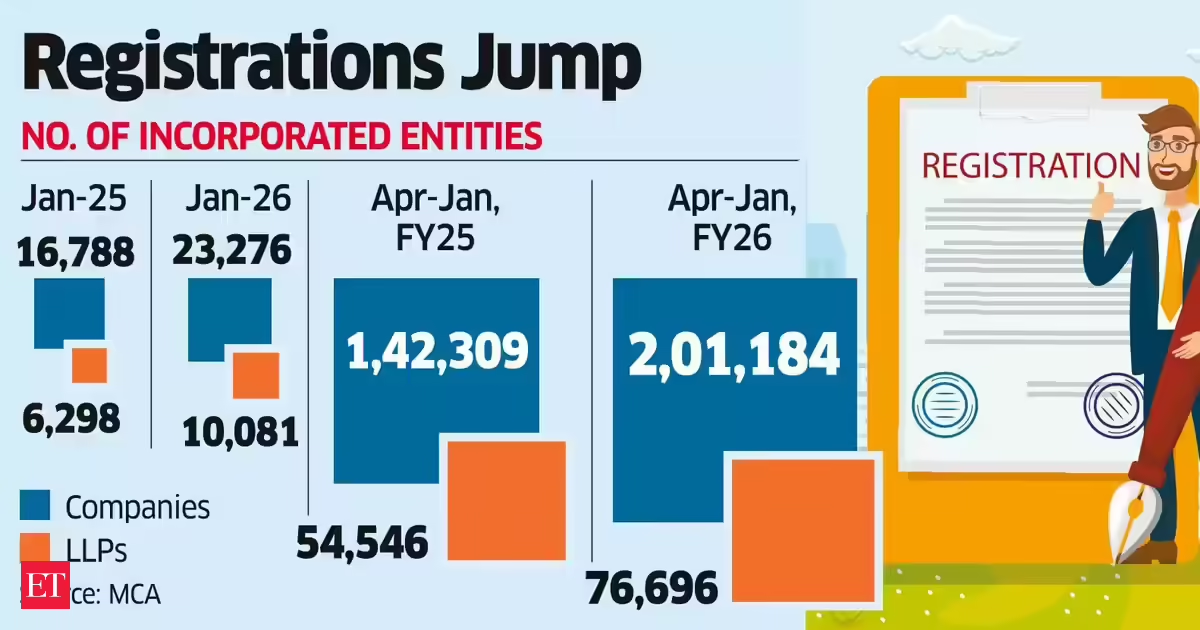
 Business3 days ago
Business3 days agoLLP registrations cross 10,000 mark for first time in Jan
-

 Tech5 days ago
Tech5 days agoFirst multi-coronavirus vaccine enters human testing, built on UW Medicine technology
-

 Tech10 hours ago
Tech10 hours agoSpaceX’s mighty Starship rocket enters final testing for 12th flight
-

 NewsBeat3 days ago
NewsBeat3 days agoWinter Olympics 2026: Team GB’s Mia Brookes through to snowboard big air final, and curling pair beat Italy
-

 Sports2 days ago
Sports2 days agoBenjamin Karl strips clothes celebrating snowboard gold medal at Olympics
-
Sports4 days ago
Former Viking Enters Hall of Fame
-

 Politics3 days ago
Politics3 days agoThe Health Dangers Of Browning Your Food
-
Sports5 days ago
New and Huge Defender Enter Vikings’ Mock Draft Orbit
-

 Business3 days ago
Business3 days agoJulius Baer CEO calls for Swiss public register of rogue bankers to protect reputation
-

 NewsBeat5 days ago
NewsBeat5 days agoSavannah Guthrie’s mother’s blood was found on porch of home, police confirm as search enters sixth day: Live
-

 Business6 days ago
Business6 days agoQuiz enters administration for third time
-

 Crypto World21 hours ago
Crypto World21 hours agoBlockchain.com wins UK registration nearly four years after abandoning FCA process
-

 Crypto World1 day ago
Crypto World1 day agoU.S. BTC ETFs register back-to-back inflows for first time in a month
-

 NewsBeat2 days ago
NewsBeat2 days agoResidents say city high street with ‘boarded up’ shops ‘could be better’
-
Sports2 days ago
Kirk Cousins Officially Enters the Vikings’ Offseason Puzzle
-

 Crypto World1 day ago
Crypto World1 day agoEthereum Enters Capitulation Zone as MVRV Turns Negative: Bottom Near?
-

 NewsBeat6 days ago
NewsBeat6 days agoStill time to enter Bolton News’ Best Hairdresser 2026 competition








